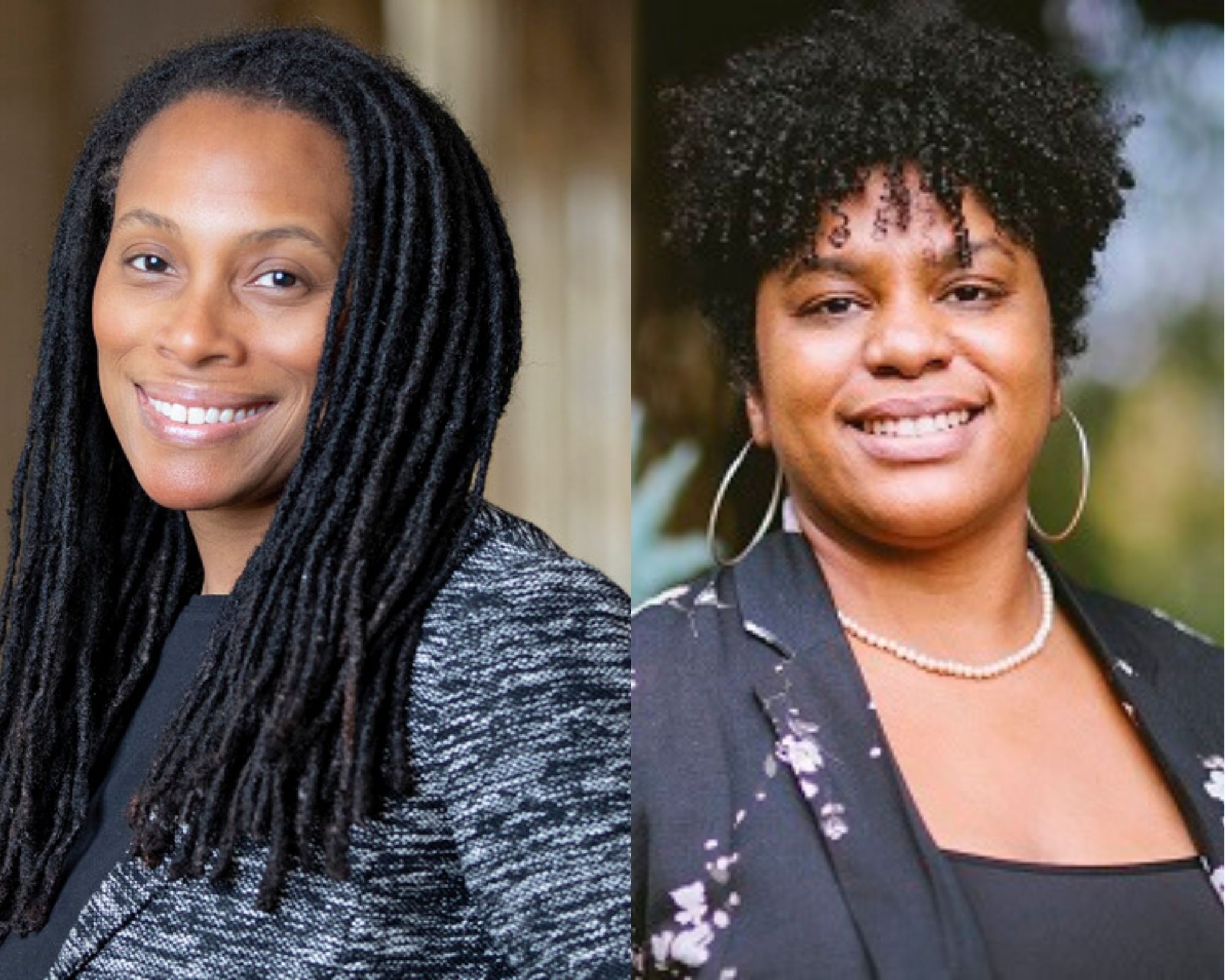Villanova’s Lepage Center for History in the Public Interest Concludes Series on “Decolonizing History” with Three Notable Events

The final event on April 21, “Decolonizing COVID-19,” includes a Live Q&A with Dr. Marcella Nunez-Smith (left), Chair of President Biden's Covid-19 Health Equity Task Force, and Dr. Sharrelle Barber (right), Assistant Professor in the Dornsife School of Health’s Department of Epidemiology and Biostatistics and the Drexel Urban Health Collaborative at Drexel University.
VILLANOVA, Pa.—The Albert Lepage Center for History in the Public Interest at Villanova University has presented a
Below are descriptions of the concluding events. For bios on the event participants, or to register for any the three virtual events, click here.
PART 1 Decolonizing Public Health: A Conversation with Dr. Graham Mooney
Wednesday, April 7, 2021, 12:30-1:30p EST
How is the history of medicine and health care in the USA marked by racial injustice and myriad forms of violence? How do past public health interventions help us understand present efforts to control COVID-19? What is the history of present practices such as quarantine, disinfection, and contact tracing? How have race and class politics informed public health systems and policies, past and present?
Dr. Graham Mooney is interested in the history of public health in modern Europe and North America. He is an Associate Professor in the Department of the History of Medicine, School of Medicine and the Department of Epidemiology, Bloomberg School of Public Health, Johns Hopkins University.
Moderated by Dr. Elizabeth Kolsky, Director, Lepage Center for History in the Public Interest, Villanova University
PART 2 Decolonizing Vaccines: A Roundtable Discussion with Dr. Merlin Chowkwanyun, Dr. Jayati Ghosh, and Dr. Farren Yero
Wednesday, April 14, 2021, 6-7:30p EST
How are inequalities within and between countries shaping the development and distribution of the COVID-19 vaccines? How does the history of vaccines help us make sense of the power and politics of vaccines and vaccination efforts today? Join us for a roundtable featuring a multi-disciplinary panel of scholars who will discuss vaccine apartheid, socioeconomic and racial health disparities, and the whitewashing of vaccine history.
Featuring:
- Dr. Merlin Chowkwanyun, Donald H. Gemson Assistant Professor of Sociomedical Sciences and a core faculty member of the Center for History and Ethics of Public Health at Columbia University
- Dr. Jayati Ghosh, Professor of Economics at University of Massachusetts Amherst
- Dr. Farren Yero, Postdoctoral Associate in Gender, Sexuality and Feminist Studies at Duke University
Moderated by Dr. Elizabeth Kolsky, Director, Lepage Center for History in the Public Interest, Villanova University
PART 3 Decolonizing COVID-19: Conversation with Dr. Sharrelle Barber and Live Q&A with Dr. Marcella Nunez-Smith
Wednesday, April 21, 2021, 12:30-1:30p EST
How are past legacies of medical racism and present socio-economic disparities shaping the disproportionate and severe impact of COVID-19 on communities of color and other underserved populations? What efforts are currently underway to ensure health equity in the government's national plan to eradicate COVID-19?
Featuring:
- Dr. Sharrelle Barber, Assistant Professor in the Dornsife School of Health’s Department of Epidemiology and Biostatistics and the Drexel Urban Health Collaborative at Drexel University
- Dr. Marcella Nunez-Smith, Chair of President Biden's Covid-19 Health Equity Task Force and Associate Dean for Health Equity Research and Associate Professor of Internal Medicine and Public Health at Yale School of Medicine.
Moderated by Dr. Elizabeth Kolsky, Director, Lepage Center for History in the Public Interest, Villanova University
The Albert Lepage Center for History in the Public Interest is a multifaceted resource that draws upon the past to impart lessons for the modern world. Led by director Elizabeth Kolsky, PhD, associate professor of history at Villanova, the Lepage Center engages the public through academic programs, research, publications, and events.
In the past three years the Center has hosted historically informed and civic-minded conversations on the ‘fake news’ crisis, the U.S. Civil War, the Holocaust, the Cold War, the state of American Democracy, the fate of democracy around the world, and more. In the summer of 2020, the Center launched an initiative to fund research and projects related to the COVID-19 pandemic. To learn more about the Lepage Center,
About Villanova University’s College of Liberal Arts and Sciences: Since its founding in 1842, Villanova University’s College of Liberal Arts and Sciences has cultivated knowledge, understanding and intellectual courage for a purposeful life in a challenging and changing world. With more than 40 majors across the humanities, social sciences and natural sciences, it is the oldest and largest of Villanova’s colleges, serving more than 4,500 undergraduate and graduate students each year. The College is committed to a teacher-scholar model, offering outstanding undergraduate and graduate research opportunities and a rigorous core curriculum that prepares students to become critical thinkers, strong communicators, and ethical leaders with a truly global perspective.
About Villanova University: Since 1842, Villanova University’s Augustinian Catholic intellectual tradition has been the cornerstone of an academic community in which students learn to think critically, act compassionately and succeed while serving others. There are more than 10,000 undergraduate, graduate and law students in the University's six colleges—the College of Liberal Arts and Sciences, the Villanova School of Business, the College of Engineering, the M. Louise Fitzpatrick College of Nursing, the College of Professional Studies and the Villanova University Charles Widger School of Law. Ranked among the nation’s top universities, Villanova supports its students’ intellectual growth and prepares them to become ethical leaders who create positive change everywhere life takes them. For more, visit
